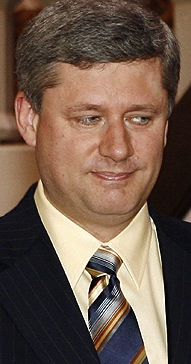The people of Canada have spoken and it was the Liberal Party and the Bloc Quebecois to which they emphatically said “No!”
But, oddly enough, it is Prime Minister Stephen Harper and his Conservatives who find themselves between a rock and a hard place.
Let me explain. As long as the Conservatives led a minority Parliament, they could tell their most radical supporters that, so sorry, they were unable to advance their far-right agenda because those perfidious Liberals, unpatriotic Bloquistes and annoying but insignificant New Democrats kept getting in the way.
But now, with a comfortable majority, they have no one but themselves to blame for failing to implement a more radical agenda.
And yet, as the New Democrats under Opposition Leader Jack Layton so amply proved by sweeping Quebec and increasing their popular vote everywhere in Canada, Conservatives now have real political considerations to ponder as they contemplate their future. Indeed, the day may come when they recall the Liberals fondly, or at least the vote-splitting opportunities the now moribund L-Shaped Party presented.
For the great Liberal coalition that flows down from Alexander Mackenzie through Wilfrid Laurier, William Lyon Mackenzie King, Lester Pearson and Pierre Trudeau to Jean Chrétien is gone forever. It was steered onto the shoals of history by the unsteady hand of Stephane Dion and the arrogance of Michael Ignatieff.
Yet since Trudeau, Canada’s last truly liberal prime minister, the party has drifted ever closer to advocating identical policies to the Conservatives, the only difference being that they were framed in softer and occasionally greener language during election campaigns. On issues of substance, Ignatieff was indistinguishable from Harper in all but his strategic incompetence.
Canadian voters have now revealed they are onto that game, and a new moderate coalition has emerged under the New Democratic banner, which more accurately represents the views of centrist Canadian voters in all parts of the country. The NDP clearly enjoys significantly greater support than the Conservatives in French Canada.
The problem this represents for the Conservatives is that they are a coalition too, as all successful Canadian political parties must be.
The specific difficulty for the prime minister, who is personally far to the right of most of his Conservative supporters and yet who is obviously no fool, is how to get Canada to where he wants it without alienating enough voters to make Layton prime minister in the next federal election, which under our Constitution must take place within five years.
Harper has already demonstrated he has the tactical smarts to achieve his goals intelligently, by treating Canadian voters like the proverbial frog in a pot of water atop a stove and raising the temperature a degree at a time.
The problem with this strategy is the danger his most radical supporters will quickly grow disillusioned with the slow pace of “reform” and split his own alliance of old Progressive Conservatives, Western Reformers, Blue Liberals and others.
Thus, in the short term, it seems unlikely the Conservatives will do much more than close the long-gun registry and continue with their purchase of overpriced stealth fighter-bombers — the first a policy the Liberals likely wish they could have adopted, and the second one they probably would have if they’d had the opportunity.
Over time, Harper the shrewd tactician may try more radical moves, but only in the context of a Canada he has edged — not shoved — to the right.
Ironically, the fact Harper succeeded during his minority years in easing Canada toward a more American style two-party system now increases the risk to the Conservatives of moving too sharply to the right, since there is really only one alternative.
The prime minister is now in a position where he risks straining his own coalition by sticking with policies most Canadian voters will accept, and risks opening the door to a revitalized NDP with support in every part of Canada by pushing policies he believes in.
This post originally appeared as David Climenhaga’s column in yesterday’s edition of the Saint City News, a weekly newspaper in St. Albert, Alberta. It is also posted on his blog, Alberta Diary.




